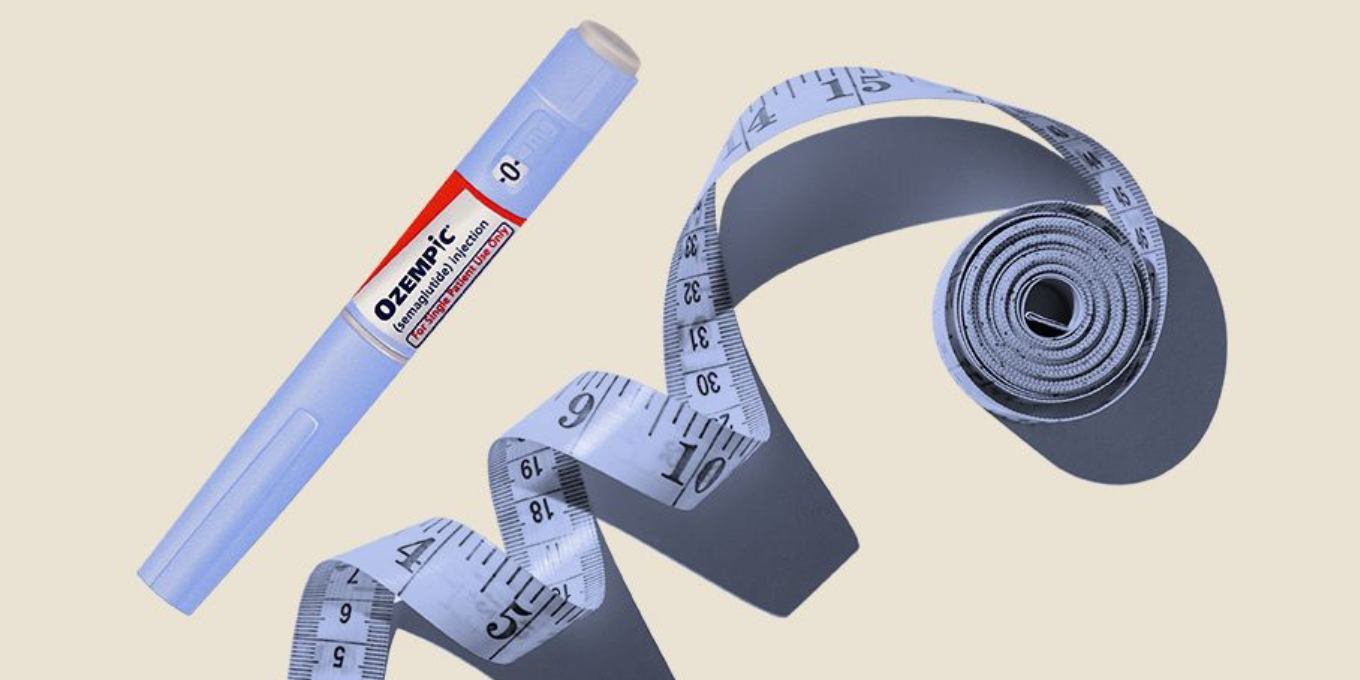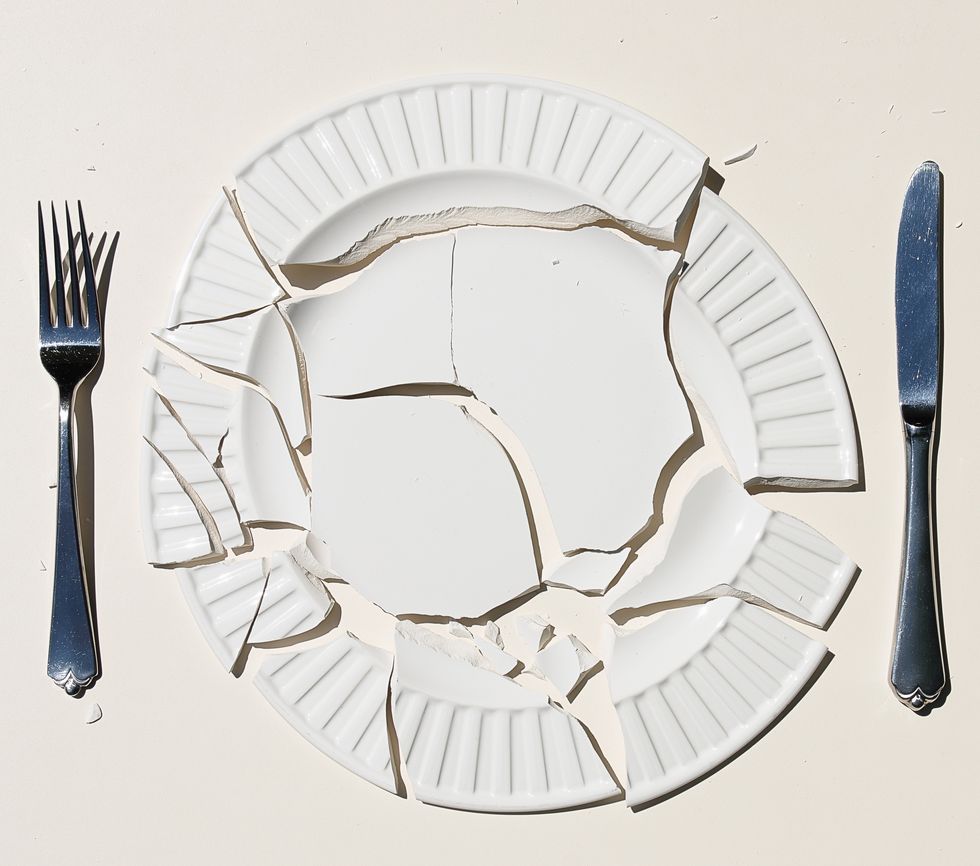Society
Ozempic Minimizes Hunger, But Does It Last?
Intuitive eating champions say it's more important to learn to listen to your body's hunger signals.
by : Claire Trageser- May 30th, 2023

Tanja Ivanova + Design Leah Romero
When the actress Mindy Kaling walked the Oscars red carpet, revealing what appeared to be a dramatic weight loss, the commentary on social media started immediately.
“Mindy Kaling threw the first brick at the Ozempic factory,” Alexis Wilson wrote on Twitter.
But the diabetes injection drug Ozempic is so buzzy that Jimmy Kimmel even referenced it in his Oscars night opening monologue, saying, ‘Everybody looks so great. When I look around this room, I can’t help but wonder, “Is Ozempic right for me?”‘
Ozempic is meant for people with diabetes. Its chemical makeup is the same as Wegovy, which is intended to treat obesity, and which got a lot of attention when Elon Musk tweeted he was taking it to look “fit, ripped and healthy.” Both work by mimicking the action of a naturally occurring hormone, GLP-1, that helps the body make more of its own insulin, says Dr. Deborah Oh, an endocrinologist with Sharp HealthCare in San Diego.
“It’s thought that because this hormone acts in several places, in addition to the effect on insulin, it also acts on the brain to decrease the hunger feeling,” she says. “It acts directly on the GI tract to slow down food passing through and therefore increase that feeling of being full.”
Basically, it makes your body digest food more slowly, and patients who take it report barely being hungry or having to remind themselves to eat. As rumours and news stories swirled that celebrities were on it–from Elon Musk to Remi Bader to Chelsea Handler to the Kardashians–more and more people started asking their doctors for the drugs. The interest has led to a shortage of medications for people with diabetes or obesity who might actually need them. And for those without those conditions, getting insurance to cover the drugs can be a struggle, which means shelling out more than $1,000 a month. Not to mention plastic surgery bills for fixing the so-called Ozempic face, where users lose so much weight that their facial skin sags and looks older.
Plus, Oh says, the drugs can have intense side effects.
“Because it acts on the GI tract, it can cause a lot of nausea and even pretty severe vomiting, so not everyone who qualifies can even tolerate the medication,” she says. “Especially if you’re taking it for not the medically-indicated reasons and maybe not under the same amount of supervision, the side effects can be severe. And in the worst case, it can trigger pancreatitis, a very severe inflammatory condition that can even lead to hospitalization and serious outcomes.”
Oh says there is also a misconception about the drugs as a quick weight loss tool–they work slowly over a year, not as a fast diet to lose 10 pounds before a wedding. “And they will not help you keep that weight off,” she says. “As soon as you stop the medication, that weight will come back.”
Ozempic is not for off-label use, says Allison Schneider, a spokeswoman for Novo Nordisk, who makes the drug. “While we recognise that some healthcare providers may be prescribing Ozempic for patients whose goal is to lose weight, we do not promote, suggest, or encourage off-label use of our medicines and are committed to fully complying with all applicable US laws and regulations in the promotion of our products,” she wrote in an email. “We trust that healthcare providers are evaluating a patient’s individual needs and determining which medicine is right for that particular patient.”
She says Wegovy, also made by Novo Nordisk, is meant for weight loss and is used to treat obesity, along with diet and lifestyle changes. And she says both drugs are from “a well-established class of medicines, which have demonstrated long-term safety in clinical trials.”
“The most common adverse reactions are gastrointestinal related,” she wrote. “For Wegovy specifically, the most common side effects may include nausea, diarrhoea, vomiting, constipation, stomach (abdomen) pain, headache, tiredness (fatigue), upset stomach, dizziness, feeling bloated, belching, gas, stomach flu, and heartburn.”
 Getty Images
Getty Images In some ways, Ozempic is presented as part of the anti-diet movement, acknowledging that diets don’t work and medication may be the only answer. There’s also another buzzy philosophy born out of the dieting backlash, but its approach is the antithesis of taking a drug to feel full.
It’s called intuitive eating and it has been around since the 1990s when two nutritionists pioneered the radically simple food philosophy: eat when you are hungry and stop eating when you are full. You can eat whatever you want, just pay attention to how your body feels, and you will not overeat.
Fast forward to now, and Evelyn Tribole and Elyse Resch are suddenly getting a lot of attention for their decades-old philosophy. The nutritionist first came up with the idea as a reaction to the calorie counting and low-fat trends in the 1980s, but it also fits in well with the anti-diet backlash and embracing your body culture of today. Intuitive eating is popular with celebrities like Demi Lovato, Lena Dunham, and Jennifer Lawrence and the hashtag #intuitiveeating has been used billions of times on TikTok. Tribole says that’s because their philosophy fits so perfectly into the anti-diet movement that has gained so much popularity in recent years.
But Tribole is horrified to see injectable drugs like Wegovy and Ozempic doing what she calls ‘co-opting of the anti-diet movement,’ because intuitive eating is about respecting bodies of all sizes. The philosophy doesn’t promise you’ll be a size 0, but that your body will be healthy and your attitude toward food will change.
@annasaccone Raising intuitive eaters 💖 #intuitiveeating #lifeafterrecovery #annasaccone #momof4 #mumof4 #4kidsmama #sacconejolys #dietculturedropout #dietcultureistoxic #recoveryispossible #recoverytok #parentingtips #fypシedrec0very #30somethingmom #milennialmom #mamaof4 #dietingsucks #saynotodiets
The difference between the philosophy and the drugs is stark. While intuitive eating teaches you to pay attention to your body’s hunger cues and only eat when you are hungry and stop eating when you are full, injectable drugs trick your body into feeling no hunger at all, or very little. So the philosophy is all about trusting your body to know what it needs, while the drugs are about masking your body’s signals.
Co-author Elyse Resch says the idea that you would have to stay on a drug for the rest of your life to avoid regaining weight raises the question of why our culture says you must be thin.
“You’re being told you’re not OK in the body you’re in, and here’s your way of changing that body, but being told what body you should be in is such an oppression,” she says. “We are promoting oppression of people in bodies that don’t fit this culturally-thin ideal.”
Resch thinks the renewed interest in intuitive eating comes from anti-diet backlash and the #metoo movement from 2016 and the social justice movement of 2020.
“It’s like, ‘stop telling me that I have to be thin to be acceptable in this world and have to spend my life thinking about how I’m eating, whether it’s right, whether it’s going to lead me to thinness,’” says Resch. “I want to eat what I want to eat, I want to be in the body that I’m going to be in, and I’m done with it.”
Resch jokes that she’s got a racket going on because people pay her to tell them to just eat what they want. But of course, it’s more than that, and many people’s relationships with food have become so warped that even hearing something as basic as “we should eat when we’re hungry and stop when we’re full,” can be truly revolutionary.
“You want to feel good, so you tend to learn how to eat when you’re comfortably hungry and learn how to stop when you’re comfortably full, because you want to feel good, and you know you can get what you want when you’re hungry again in a few hours,” she says. “It’s such a wonderful, exciting experience.”
And, she says, changing that attitude means getting back so much of your brain space, because you won’t be obsessing about food. “We have a purpose, and when your purpose is just staying as thin as you can and doing everything you can do to do that, it really takes your mind, your mind time and space and all that, right?” she says.
For her co-author Tribole, any new diet or drug will mean people will continue to need to be taught intuitive eating. “As long as people are going to be endorsing intentional weight loss by some method, there’s going to be the need for intuitive eating to help them as a pathway out of the suffering that happens when you become so focused on changing your body size at any cost,” she says.
Tribole says when you’re trying to lose weight, you lose trust in yourself in the process of eating, and increase anxiety around eating.
“When you’re outsourcing your eating decisions to plans, influencers, and so on, it comes at the big expense of disconnecting from yourself, and so it gets really messed up,” she says. “Then the need is there to be retaught how to eat. And so what I say is, when you’re tired of being on the diet treadmill and being a diet casualty, we have a way to help you through this.”
And it starts with listening to your body, not hopping on whatever is the current diet drug or trend.
This article originally appeared on ELLE UK.
Read more:
8 Canadian Body-Positive Accounts to Follow
15 Female-Empowering Instagram Accounts to Follow
Living the Soft Life
Newsletter
Join our mailing list for the latest and biggest in fashion trends, beauty, culture and celebrity.
Read Next

Fashion
Are Fashion Brands Getting Greener?
While the fashion industry is making a lot of noise about being more sustainable, a closer look shows that its earth-friendly commitments are often more illusion than reality.
by : Marouchka Franjulien- Apr 19th, 2024

Beauty
What Beauty Packaging Is Actually Sustainable?
We sought out leaders in the field to help us get to the bottom of the blue bin once and for all.
by : Victoria Christie- Apr 19th, 2024

Culture
Discover Club Med’s Stunning Exclusive Collection
Vacation destinations that bring pure luxury and comfort.
by : ELLE Canada- Apr 8th, 2024




